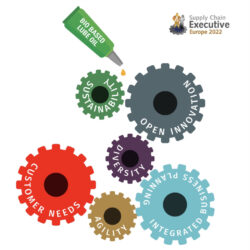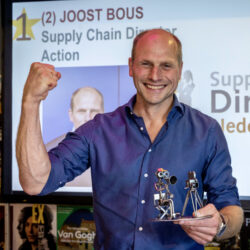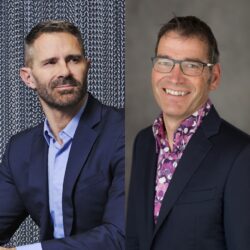Advice to supply chain leaders: don’t judge – ask questions

Good leadership requires self-insight. That was the message that lingered after the leadership session by recruitment agency Inspired-Search. Former speed skater Mark Tuitert shared insights that led him to Olympic gold. ‘Good leaders never assume they already know everything but keep asking questions. And sometimes that means asking for help.’
By Marcel te Lindert
Two insights contributed significantly to Mark Tuitert winning Olympic gold in 2010 after two missed opportunities in 2002 and 2006. The first being that team interest is also his self-interest. ‘If you see me skating, I ride the laps by myself. But what you don’t see is that I work with other skaters every day. That generally consists of riding in a pack. Together with a sprinter and a stayer, two completely different types. Like you have to work together with people from marketing and IT,’ said Tuitert, who excelled at middle distances.
Skating in a pack demands precision. ‘When sprint training is on the programme, we draft off the sprinter. He takes us to a higher speed than we could ever achieve ourselves. The next day, the stayers ride in front. They never go very fast but keep going and never stop. That’s how we raise the bar of our team a little higher every day. If you keep that up for four years until the Olympics, you can achieve success. Just like in any other project.’
Headstrong
Looking after team interests does not come naturally. Tuitert has often seen it go wrong, not only in sports but also in business. ‘When egos become bigger than team interests, things go wrong. If the sprinter rides so fast that no one can keep up with him, everyone rides with their head in the clouds, and no one reaches their top level anymore. The next day, the stayer does the same and also skates so fast that no one can keep up with him. The egos may be appeased then, but the level drops.’
If there is no more cooperation, the chances of success visibly diminish. ‘But apart from that, it’s just not fun anymore. I’d rather build a synchronized skating pack than a bunch of egos. That is an important component of leadership: getting people on board, explaining their tasks and responsibilities, and keeping the fun going. That is essential.’
Asking for help
If anything, the second insight – self-insight – is even more important. ‘We take ourselves everywhere we go. If we don’t get to know ourselves, we don’t get to know the world,’ argued Tuitert, who, after eight years of top-level sport, thought he knew it all. He came to his senses when he missed the Olympics for the second time in 2006. ‘If you think you already know everything, you stop learning. Good leaders never assume they know everything but they keep asking questions. And sometimes that also means asking for help.’
Tuitert discovered that he had been subconsciously inhibited for years by the disrupted relationship with his father. Due to his parents’ acrimonious divorce, he didn’t speak to him for six years. ‘I was angry with my father and blamed him for everything. I called him and contact was restored. Four years later, my father was in the stands cheering with my two brothers when I won Olympic gold.’
Try not to judge
Many of his insights come from Stoicism, a philosophical movement from ancient Greece. One of the Stoic teachers is Epictetus. ‘We go through things in our lives that lead to emotions, like the anger towards my father. Epictetus would say that anger is not because of your father, but because of your own judgement of your father. There is a huge grain of truth in that. We are used to forming judgements very quickly. A judgement implies that you know how things are, but that is often just an assumption. So try not to judge. Ask questions instead.’
Gaining self-insight was a common thread during Inspired-Search’s leadership session. For supply chain executives who want to get to know themselves better, the executive search specialist organizes a leadership trail in Spain. During a seven-day hike, eight supply chain executives have every opportunity to learn and reflect together and explore their personal motivations. Edwin Tuyn and Oskar Verkamman of Inspired-Search know better than anyone else how important that is. When Tuyn wants to relax, he heads into the countryside to take photos of nature. Verkamman makes long treks through Central Asia and the Middle East on his motorbike.
Camino Francés
Perry Buenen, the current COO of Eriks, explained the insights he gained while walking the Camino Francés, the trail from the south of France to Santiago de Compostela in Spain. He decided to walk it after quitting his job at Johnson & Johnson. ‘I thought about the next step in my career for a long time, but I couldn’t figure it out. I deliberately walked by myself to be alone and find peace.’
As he walked, memories of his long career, mostly leading large-scale supply chain transformation projects, came naturally. What were the successful transformations where everything seemed to work by itself? And what were the transformations that were slightly more difficult? ‘What I learnt during the journey was the importance of flexibility. In a transformation project, you have to stick to the end goal but accept that the path towards it is not always the same.’
Be flexible
Buenen admitted he was not as flexible in the first 10 years of his career. ‘That is the period I look back on less positively. Maybe I did reach the end goal, but it took a hell of a lot of energy. Every day, I had to convince everyone to stick to the path I had set out. That is gruelling and ineffective. Be flexible, listen to your environment and don’t make a big deal out of it if the path goes a little off track.’










